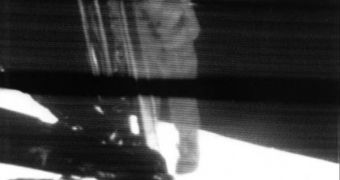Back in 1969, when the Apollo mission landed on the Moon, Neil Armstrong uttered his famous phrase “One small step for man, one giant leap for mankind” upon setting foot on the lunar soil for the first time. Now, a linguist shows that the astronaut also meant to place an “a” before the word “man” but that he failed to do so on account of the pressure of the moment. However, he explained, the phrase, in the form that has remained embedded in history, is more poetic this way than if it were grammatically correct. Its symmetry and rhythm thus captured one of the most important moments in history in a very appropriate manner, the expert added, quoted by BBC News.
When the Apollo 11 crew returned home, Armstrong said that he uttered the “a” but reckoned that the world must have gotten lost on account of static, or because of his Ohio accent, in which the vowel is pronounced very softly. Several linguist studies have been carried out over the years on the famous phrase, and one conducted in 2006 found that, in the transmission, there was a gap where the letter should have been. The main reason why the correct form of the statement needs to be found is because the words “man” and “mankind,” in the context they were used by the astronaut, signified roughly the same thing.
“For me that phrase is of great significance. It has been an important part of my life and those words sum up much of the optimism of the later part of the 20th Century,” said the author of the new Haynes book Apollo 11, an Owner's Manual, Dr. Chris Riley. The co-author of the work was John Olsson, a forensics linguist. They will be presenting the findings this week at the Cheltenham Science Festival, in the UK.
The book is based on the countless recordings of Neil Armstrong's voice, that the two played over and over again. The recordings spanned a larger period of time, including moments from before, during and after the actual mission. Using re-mastered and re-digitized recordings provided by NASA, and analyzing them with a voice print spectrograph, the team concluded that there was no room for an “a” in the statement, as the “r” in for and the “m” in man ran into each other in the recording. “It's perfectly clear that there was absolutely no room for the word 'a',” Olsson said.
However, the team discerned the fact that the Commander indeed wanted to say “a man” on account of the intonation in his voice. “This indicates that he’s doing what we all do in our speech, he was contrasting using speech – indicating that he knows the difference between man and mankind and that he meant man as in 'a man' not 'humanity',” Olsson added.
“When you look at the pictures, you see that he's moving as he is speaking. He says his first word 'that's' at the moment he puts his foot on the ground. When he says 'one giant leap for mankind', he moves his body. As well as this, there is no linking conjunction such as 'and' or 'but' between the two parts of the sentence. So it's for all those reasons that we think this is a completely spontaneous speech,” he added, addressing critics who argue that the catch phrase Armstrong said was pre-fabricated and not the result of “live” inspiration.

 14 DAY TRIAL //
14 DAY TRIAL //